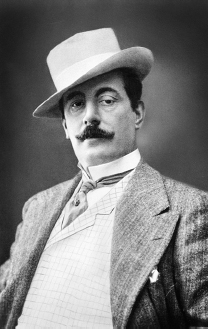Giacomo Puccini (1858–1924)

Giacomo Puccini was the main Italian opera composer after Verdi; indeed, he may be said to have brought to an end the great tradition of Italian Romantic opera, which had begun a century before. Several operas Puccini composed around 1900 are perennial favorites, thanks to his special gift for short, intense vocal melodies and his canny sense of the stage.
Most of Puccini’s operas are touched by the new realistic tendencies in late Romantic opera, but they also tend to distance the audience from what would otherwise be quite harsh dramatic messages. The locales of his operas range from contemporary Japan to the American Wild West, and from Rome in 1800, under Napoleon, to Beijing in the distant past. In these remote, even exotic sites, Puccini found it easier to view realistic stories through a Romantic and sentimental lens.
Capitalizing on Romantic psychological depiction in opera, Puccini specialized in intimate portraits of helpless women in hopeless situations. Such is the actress Tosca, propositioned by the police chief of Rome as the price for her lover’s life (Tosca); or the poor seamstress Mimi, dying of tuberculosis (La Bohème); or the geisha Cho-